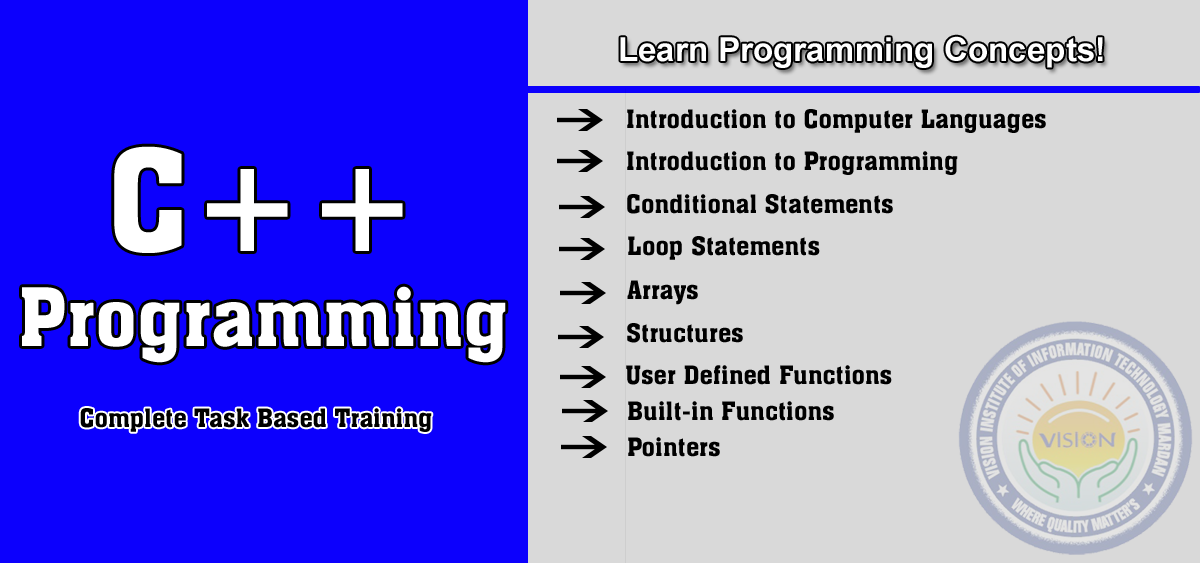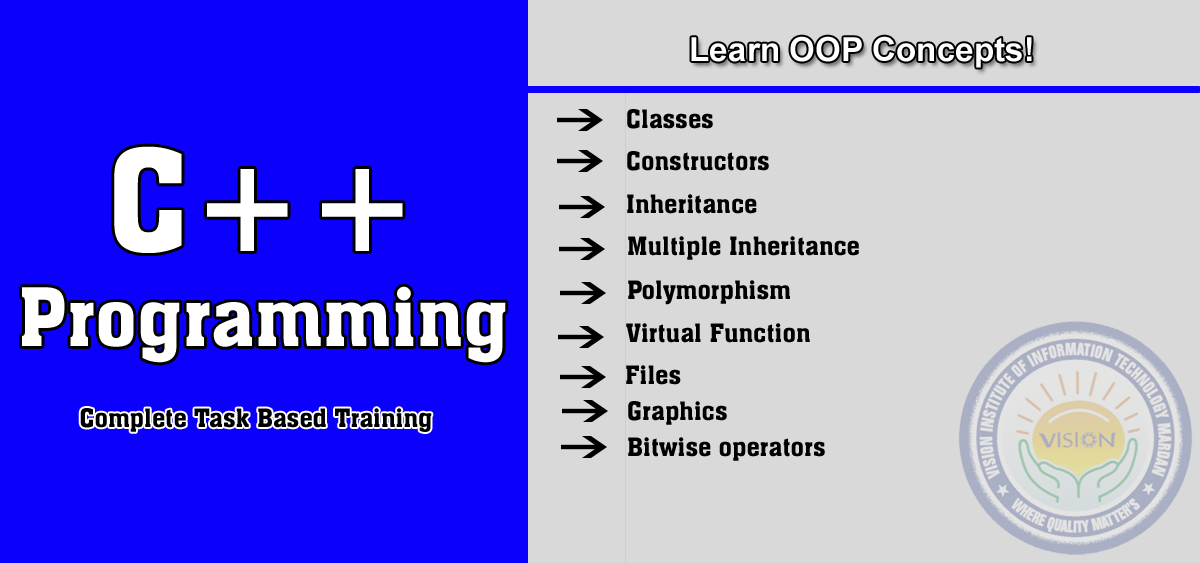

Instructor
Mr. Ubaid Ullah, Mr. Mustafa Kamal
Timing
Afternoon
Duration
2 Months
Fee
PKR 12000/-
Contact
+92-331-5875434
Brief introduction
Programming is the process of creating a set of instructions that tell a computer how to perform a task. Programming can be done using a variety of computer "languages," such as SQL, Java, Python, and C++.
In this C++ Programming course, a student is ready to develop powerful C++ programs and understand the fundamentals of computer programming as well as Object Orientation. furthermore, a student will be able to apply for C++ jobs, with a minimum of a chance of success.
- Computer Language
- Computer Program
- Types of Programming Languages
- Low-Level Languages
- High-Level Languages
- Source & Object Program
- Functions of Translators
- Types of Translators
- Assembler
- Complier
- Interpreter
- Types of High Level Language
- Selection of High Level Language
- History of C++
- History of C++
- Structure of C++ program
- Preprocessor directives
- Header file
- The Main() function
- C++ statements
- Keywords
- Tokens
- Variables
- Data types in C++
- Declaration of variables
- Initialization of variables
- Constants
- Arithmetic operators
- Arithmetic expression
- Order of precedence of operator
- Basic input/ output
- The cout object
- The escape sequence
- The endl manipulator
- The setw manipulator
- Assignment statement
- The cin object
- Compound assignment statement
- Compound assignment expression
- Increment and decrement operator
- The increment operator (++)
- The decrement operator (- -)
- The comment statement
- Conditional Statements
- Relational expressions
- Relational operators
- The if statements
- The if-else statement
- The nested if statement
- The nested if-else statement
- The switch statement
- The break statement
- The nested if-else and switch statement
- The conditional operator
- Logical operator
- The && (And) operator
- The || (or) operator
- The ! (Not) operator
- The goto statement
- Loop Statements
- The while loop
- The do-while loop
- The continue statement
- The break statement
- The for loop
- The nested loops
- One-dimensional array
- String variables
- Sorting arrays
- Bubble sort
- Selection sort
- Multi-dimensional array
- Initializing tables
- Initializing characters
- Structures
- Defining a structure
- Structure variables
- Accessing members of a structures
- Initialization of structure variables
- Array type members of structure
- Structure variables as array
- Initialization of array of structure
- Nested structure
- Initialization of nested structure
- Accessing members of structure
- Built-in functions
- User-defined functions
- Function declaration (prototype)
- Function definition
- Calling a function
- Passing arguments to functions
- Passing arrays as arguments to a function
- Passing structure to functions
- Returning data from functions
- Return statements
- Declaration of function that returns a value
- Calling a function that returns a value
- Function definition that returns a value
- Returning structures from function
- Local and global variables
- Local variables
- Global variables
- Static variables
- Local and global functions
- Reference parameters
- Default arguments
- Command line arguments
- Inline functions
- Function overloading
- Function template
- Built-in functions
- Accessing built-in functions
- Arguments of functions
- Built-in functions of Conio.h
- Built-in functions of Stdio.h
- Built-in function of String.h
- Built-in function of Math.h
- Memory addresses and variables
- Pointer variables
- The void type pointers
- Pointers and arrays
- Pointers and strings
- Array of pointers
- Introduction to OOP
- Members of a class
- Data members
- Member functions
- Member access specifiers
- Objects
- Declaring objects of a class
- Calling member functions
- Defining member functions outside the class
- Storage of objects in memory
- Constructors
- Initializing data using constructors
- Constructor overloading
- Destructors
- Passing objects as arguments
- Friend function
- Inheritance
- Single inheritance
- Protected access specifier
- Defining derived classes
- Types of inheritances
- Public inheritance
- Private inheritance
- Protected inheritance
- Derived class constructors
- Constructors in single inheritance with arguments
- Multiple inheritance
- Constructors in multiple inheritance
- Polymorphism
- Pointers to objects
- Early binding
- Virtual function
- Late binding
- Pure virtual function
- Abstract base class and Concrete derived class
- Terminologies used for data files
- Streams and files
- Opening files
- File operation modes
- Testing file open operation
- Formatted input/ output
- Detecting ?End-of-file? (EOF)
- Writing and reading single characters
- Reading one line from a file
- Binary input/ output
- Writing and reading in binary mode
- Writing and reading objects into files
- Random access files
- Output on the printer
- Polymorphism
- Pointers to objects
- Early binding
- Virtual function
- Late binding
- Pure virtual function
- Abstract base class and Concrete derived class
- The bitwise & (And) operator
- The bitwise | (or) operator
- The bitwise ^ (XOR) operator
- The bitwise ~ (compliment) operator
- The left-shift (<<) operator
- The right-shift (>>) operator




